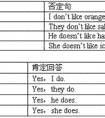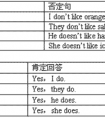Can the student ____ a computer ____ music? [ ]A. uses; to writeB. use, writing C. use, to write-五年级英语
题文
| Can the student ____ a computer ____ music? |
| [ ] |
| A. uses; to write B. use, writing C. use, to write |
答案
| C |
据专家权威分析,试题“Can the student ____ a computer ____ music? [ ]A. uses; t..”主要考查你对 实义动词,动词不定式 等考点的理解。关于这些考点的“档案”如下:
实义动词动词不定式
考点名称:实义动词
实义动词:
与系动词是相对的,系动词亦称连系动词,作为系动词,它本身有词义,但不能单独用作谓语,后边必须跟表语(亦称补语),构成系表结构说明主语的状况、性质、特征等情况。
实义动词意思完全,能独立用作谓语。
实义动词有及物动词和不及物动词(及物动词是指后面要求有直接宾语的动词;
不及物动词指后面不需要跟宾语的动词)即行为动词,表示动作的动词。
实义动词(又称行为动词):表示行为或状态,有完全的词义,能独立作谓语。
如:I go to school by bus. 我乘公交车去上学。
The students clean their classroom every day. 学生每天打扫教室。- 及物动词:
后面必须跟宾语,意义才完整的实义动词,叫做及物动词(transitive verb)。
英语中的及物动词有:interest,worry,guss,please,surprise,love等
例如:I believe that the committee will consider our suggestion.我相信委员会将会考虑我们的建议。
“How long can I keep the book ”Harry asked.哈里问:“这本书我可以借多久?”
Dr. Bethune set us a good example. 白求恩大夫给我们树立了好榜样。
Crude oil contains many useful substances.原油含有许多有用的物质。
不及物动词:
本身意义完整,后面不用跟宾语的实义动词,叫做不及物动词(intransitive verb)。
Birds fly.鸟会飞。
It happened in June 1932.这件事发生于一九三二年六月。
My watch stopped.我的表停了。
She spoke at the meeting yesterday evening. 她在昨天晚上的会上发了言。
兼作及物动词和不及物动词:
英语里有不少实义动词可以兼作及物动词和不及物动词。
这样的动词又有两种不同的情况:
a)兼作及物动词和不及物动词时,意义不变。试比较:
Shall I begin at once?我可以立刻开始吗?(begin作不及物动词)
She began working as a librarian after she left school.她毕业后当图书馆管理员。(began作及物动词)
When did they leave Chicago?他们是什么时候离开芝加哥的?(leave 作及物动词)
They left last week. 他们是上周离开的。(left 作不及物动词)
b)兼作及物动词和不及物动词时,有时意义不尽相同。如:
Wash your hands before meals.饭前要洗手。
Does this cloth wash well? 这布经得起洗吗?
与汉语的比较:
有时英语动词的及物和不及物的用法,与汉语的用法完全不一样,请注意下列两种情况:
a)有的动词在英语里只能用作不及物动词,而汉语则可用作及物动词,如arrive到达,agree同意,listen听。英语里这些动词后面常接介词。如:
We arrived at the railway station at noon.我们于中午到达火车站。(at不能省去)(比较:We reached the railway station at noon.)
Everybody listened to the lecture with great interest.每个人都很有兴趣地听讲课。(to不可省去)(比较:We all heard the lecture.)
Do they agree to the plan?他们同意这个计划吗?(to不可以省去)
b)有的动词在英语里能用作及物动词,而在汉语里则不能用作及物动词,如serve为…服务。
Our children are taught to serve the people wholeheartedly.我们的儿童被教以全心全意为人民服务 - 特殊实义动词:
英语动词很多既是及物动词又是不及物动词,如
close, begin, study, leave, work等。
①The post office closes at 9:00 p. m.邮局晚上9点关门。
②Close the window,please.请关窗。
③Shall we begin now?我们现在开始吗?
④ Bill began working as a sailor after he left school.比尔毕业后当水手。
⑤They left yesterday.他们昨天离开的。
⑥When did you leave Washington?你什么时候离开华盛顿的?
⑦The students study hard.这些学生学习努力。
⑧The students study English and German.这些学生学习英语和德语。
⑨He works in a supermarket.他在一家超市工作。
⑩He works the machine on Mondays.他星期一操作这台机器。
考点名称:动词不定式
- 不定式定义:
由to+动词原形构成。不定式是一种非限定性动词。而非限定动词是指那些在句中不能单独充当谓语的动词,可分为不定式,动名词,现在分词和过去分词。
“动词不定式”由动词+不定式构成。动词不定式在句中可以作句子除谓语之外的任何句子成分。动词不定式的被动形式除了一般形式外还有其完成式和进行式。
常见的有:like / love,want,need,ask,help等。
例:I like to play with Tom. 我喜欢和汤姆玩。
I want to play with Tom. 我想和汤姆玩。
I like to eat dumplings. 我喜欢吃饺子。 - 动词不定式一般结构:
疑问词who,what,which,when,where,whether,how后可接不定式构成不定式短语,在句中作主语、宾语、表 语等。如:
①When to leave for London has not been decided yet. (不定式在句子中做主语)
②Mr. Smith didn't know whether to leave or stay there. (不定式在句子中做宾语)
③I asked Professor Xu how to learn English well. (不定式在句子中做直接宾语)
④The question was where to get the medicine needed. (不定式在句子中表语)
以上例句中疑问词+不定式部分,均可转换为相应的从句形式。如:
①When we shall leave…
③…how I could learn…
经常在这种结构中使用的动词有:
consider,decide,discover,explain,find out,forget,hear,know,lea rn,observe,understand,wonder等。 - 动名词与不定式的区别:
1 动名词与不定式的区别:
动名词表达的是:状态,性质,心境,抽象,经常性,已发生的
不定式表达的是:目的,结果,原因,具体,一次性,将发生的
2 接不定式或动名词,意义相同。
3在下列情况下,一般要用不定式:
①hate,like,love前有would(should)时,
如:I'd like to have a cup of coffee.
②当谓语动词begin,continue,start等是进行式时,
如:Thestudents are starting to work on the di fficult maths problem.
③begin,continue,start与know,understand等状态动词连用时,
如:I soon began to understand what was happening.
④.advise,allow,encourage,forbid,permit等动词后接动名词作宾语,或带不定式作宾语补足语。如:
Our teachers don't permit our/us swimming in the lake.
Our teachers don't permit us to swim in the lake.
4 部分动词后接不定式或动名词时,意义差别较大,应根据句子语境选择使用。
forget,remember,regret后接不定式,表示现在或未来的动作,接动名词表示动作已经发生。如:
- 最新内容
- 相关内容
- 网友推荐
- 图文推荐
| [家长教育] 孩子为什么会和父母感情疏离? (2019-07-14) |
| [教师分享] 给远方姐姐的一封信 (2018-11-07) |
| [教师分享] 伸缩门 (2018-11-07) |
| [教师分享] 回家乡 (2018-11-07) |
| [教师分享] 是风味也是人间 (2018-11-07) |
| [教师分享] 一句格言的启示 (2018-11-07) |
| [教师分享] 无规矩不成方圆 (2018-11-07) |
| [教师分享] 第十届全国教育名家论坛有感(二) (2018-11-07) |
| [教师分享] 贪玩的小狗 (2018-11-07) |
| [教师分享] 未命名文章 (2018-11-07) |




![We ____________together. [ ]A. read a bookB. sleep-一年级英语](http://www.00-edu.com/d/file/ks/4/1/60/2019-08-28/smallea4b9832081df346c35e7fe937dd76101566947664.gif)
![What's he doing? He's ___________. [ ]A. readingB. drawing-四年级英语](http://www.00-edu.com/d/file/ks/4/1/60/2019-08-28/small07eb195a0f249b46b2d76d31ab9e28261566947675.jpg)
